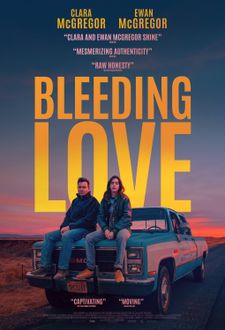 |
| Bleeding Love Photo: Glasgow Film Festival |
Director Emma Westenberg’s coming-of-age drama, Bleeding Love, follows a young woman (Clara McGregor) and her estranged father’s (Ewan McGregor) attempts to reconnect during a road trip to Santa Fe, New Mexico. The journey opens old wounds, as the father tries to help his daughter with the drug addiction struggles he believes she has inherited from him.
Speaking with Eye For Film, Westenberg discussed expressing the collective experience of finding oneself and embracing the absurdity of life.
 |
| Bleeding Love |
Paul Risker: What compelled you to want to tell this story at this point in time?
Emma Westenberg: When I read the script, I connected to the characters and this journey of reconnecting, but also of finding yourself, because it was a coming-of-age. There were a lot of personal connections for me in the story and both of the actors were already attached to it and I wanted to work with them. So, it was a combination of different factors, from the theme to the personal hook.
PR: The visual language of the film is not passive but is an active participant in the storytelling. What was the thought process behind the cinematography?
EW: The idea for the visual approach was to follow the daughter's emotional journey and try to visualise it. In the beginning, she feels estranged from her father, and she's in this cycle of self-destruction. To portray this, we separated them in the frame, and we used angles where you don't see a lot of the horizon. Also, the colours are quite stark, and the light is hard. As the story progresses and the characters become closer, you start to see more of the horizon and their surroundings. The beauty of the road comes alive and it's more vibrant with colours.
 |
| Bleeding Love |
PR: Accessing the characters’ emotional vulnerabilities is important, and I suppose the task is making it relatable for an audience, most of whom will have experienced finding oneself, and will critique it through their personal experience.
EW: Of course a movie is never going to be for everybody. It's dependent on your mood and humour is a big part of how I experience the world and situations. There’s a lot of absurdity in reality and I wanted to bring that into this story to make it approachable for the viewer, but that also depends on your taste.
Everybody who was involved in the film, including Ewan and Clara, brought a lot of their own personal experiences to the table. We would talk a lot about our own life experiences, our relationships with our parents, with substance abuse or not, and then try to find the truth. It was a very open and collaborative experience with both Ewan and Clara in finding the essence of every scene and connecting it to our own experiences, but also finding a collective experience.
PR: Could we describe filmmaking as an exercise in empathy?
 |
| Bleeding Love poster |
EW: When I encounter people, in general, I try to understand them and where they're coming from. I try to find common ground and that’s why I like filmmaking – the collaborative aspect of finding the middle ground in a scene, the connective tissue of what it is to be human.
PR: Finding that connective tissue and trying to understand human nature can lean into the intellectual, philosophical and psychological, but on the other hand, cinema also seeks to entertain. The two are not necessarily exclusive, and a film can offer a diverse experience.
EW: It depends on the mood of the audience and how it comes in at that moment, but I find entertainment to be very important because so much of cinema is this visual festivity and world building that pulls you in. I definitely like to work with that, and I like movies that take your time into account. It’s nice if they make an effort to make it enjoyable. I also love reading as well, and I already spend so much time working on the screen that I like taking in stories differently.
Bleeding Love was released in select theatres and On Demand in the US on 16th February and will play at the 2024 Glasgow Film Festival.





















